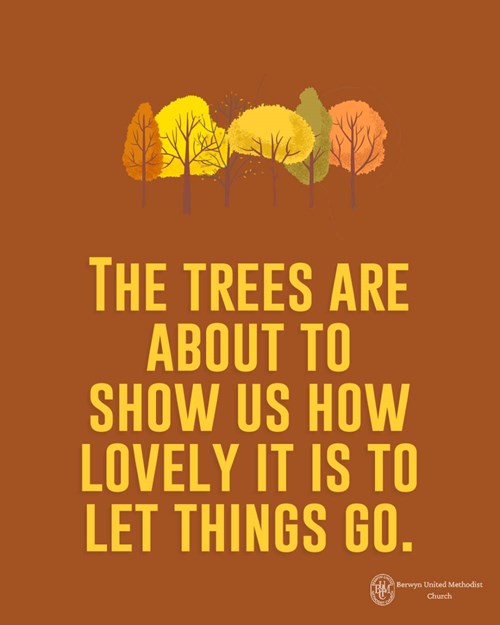
Dear Berwyn Church Family,
As we stand at the threshold of a new season in the life of our church, a season marked by introspection and renewal, it's natural to feel a sense of both sadness and celebration. We find ourselves in a time when we are called to spend less, shed excess expenses, and even repurpose our facilities. Each ministry or way of being the church we must let go of is like a beloved leaf on a tree that has brought beauty and vitality during its time. However, we must remember that letting go is not a sign of failure but a testament to our church's capacity for growth and change, just as it is for the trees in the fall.
Ministries as Leaves on a Tree: Consider for a moment the image of a mighty tree standing tall in the forest. As the seasons shift and the days grow shorter, the tree sheds its leaves, letting go of the vibrant symbols of life that once adorned its branches. From one perspective, this act of shedding leaves can be perceived as a loss, akin to how we may lament the closure of a cherished church ministry.
But let us view this through a different lens—a lens that acknowledges the profound wisdom of nature and faith. Just as the tree releases its leaves to prepare for the next season, we, too, must make decisions about our ministries to ensure our church's vitality and mission. Like the tree, we're not failing; we're evolving and adapting to meet new needs.
The Spiritual Lessons in Change: In the face of change, we are reminded of the spiritual journey that we all embark upon. Change is an essential part of life and can be challenging and beautiful. These changes may seem like a painful loss, but it's also an opportunity for new growth and transformation.
As Ecclesiastes 3:1-2 (NIV) reminds us: "There is a time for everything, and a season for every activity under the heavens: a time to be born and a time to die, a time to plant and a time to uproot." Just as the fallen leaves nourish the soil for future growth in the forest, the lessons and experiences from our past ministries enrich the fertile ground of our church community.
The Blessings of Renewal and Dormancy: In this season of transition, let us remember that each decision is guided by faith and a vision for the future. We celebrate the life and impact of every ministry that has graced our church and cherish the spiritual growth and connections they have fostered.
As we enter this time of change, we must also acknowledge the spiritual significance of dormancy. Just as trees seem asleep, dormant, or even dead during the winter months, they are, in fact, resting, regrouping, and preparing for new growth that comes with the following spring.
Without the shedding of leaves and the restful winter period, the tree would die, and no new life would be possible. Similarly, in our church, by letting go of ministries that may have served their purpose, we create space for spiritual renewal and the emergence of new, vibrant ministries.
Closing: Dear friends, may we move forward with hearts filled with gratitude for the past and hope for the future. Let us not view these changes as failures but as opportunities for God's grace and purpose to manifest in our church's life.
With faith in our hearts and a vision for a stronger, more vibrant church community, let us embark on this journey of change together. Just as the tree sheds its leaves to prepare for the next season's growth, we, too, let go of what was to make way for what will be. And in the dormant seasons, let us find rest and renewal, trusting that God's plan is unfolding and new life will spring forth.
Pastor Kevin Rutledge
links
This post was orignally published in the October 2023 of the Lighted Cross. Please use the links below to view the full newsletter.
Download PDF